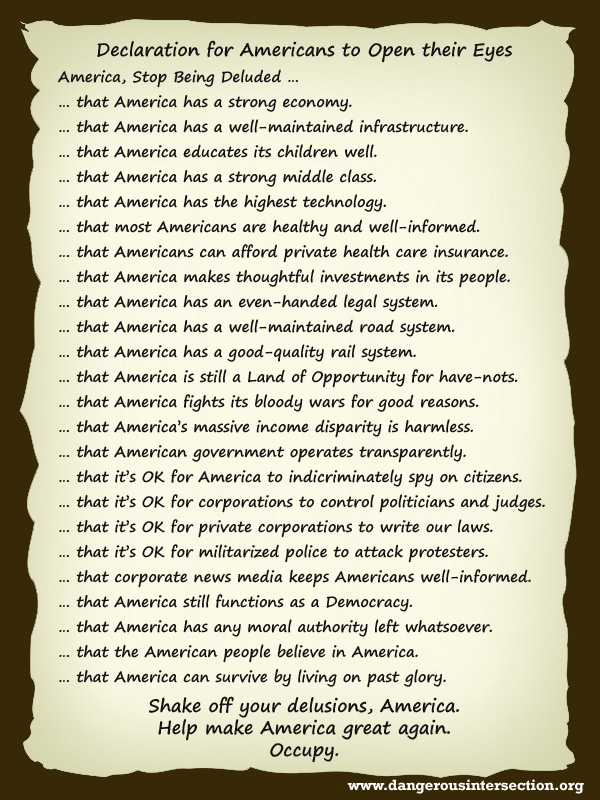Consider the joy shown by Americans celebrating the Fourth of July.  If the Fourth is such a happy time, shouldn’t we now be equally furious that the government has been rigged to ignore the needs and wants of the People? Over the past few years, I've heard dozens of educated middle class Americans admit that Congress has ben bought―federal corruption at the highest levels is now accepted as unquestionable truth.
More recently, I’ve run into more than a few people who have become frustrated with the Occupy movement. For instance, last week I heard this from an acquaintance, who was speaking of the protesters:
If the Fourth is such a happy time, shouldn’t we now be equally furious that the government has been rigged to ignore the needs and wants of the People? Over the past few years, I've heard dozens of educated middle class Americans admit that Congress has ben bought―federal corruption at the highest levels is now accepted as unquestionable truth.
More recently, I’ve run into more than a few people who have become frustrated with the Occupy movement. For instance, last week I heard this from an acquaintance, who was speaking of the protesters:
Acquaintance: “They should get a job. What the hell are they expecting to accomplish out there?”
Me: Isn’t it a huge problem that all three branches of our federal government make decisions to accommodate large corporations, often ignoring the needs of ordinary citizens? Isn’t that worth protesting.
Acquaintance: “Still, the protesters are stupid.”
Me: What is your solution? Ordinary people are barred from participating in a government that is supposedly to be run by ordinary people. Further, the news media is largely under the control of these same interests―they are too often serving as stenographers for the corporations that pull the strings of the federal Government.
[Fourth of July flag photo]
Acquaintance: [Silence].
Along the same lines, here’s an excerpt from an email I recently received from a DI reader:
About your note regarding ways to support the Occupy movement... yes, you are right to encourage people to talk about what is going on, but don't you think that it is time for those who are actually doing the "occupying" to go home and do their homework. It seems pretty apparent that it is mostly the late teen to early 20 year olds that are involved and that they don't seem to have any really intelligent, well thought out ideas or goals. The media and general public are already bored with the story, and the whole thing will have been an exercise in futility unless they move on in a dignified way. Their goal should be to have an effect on the 2012 election which is a full year away. They should go home and get organized and become better informed in order to form a voting block that will further their agenda (that is if they can come to a consensus as to what that agenda is).
In short, this reader wants the Occupiers to return home to do the same thing that millions of people have been doing for the past decade, i.e., doing nothing likely to invoke change.
[More . . . ]


